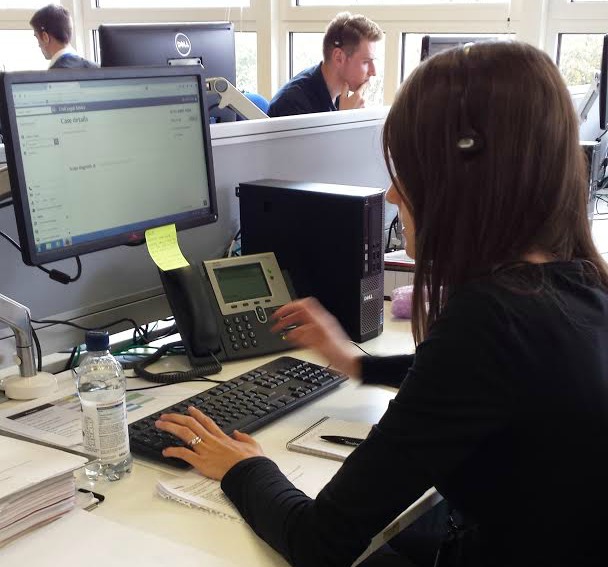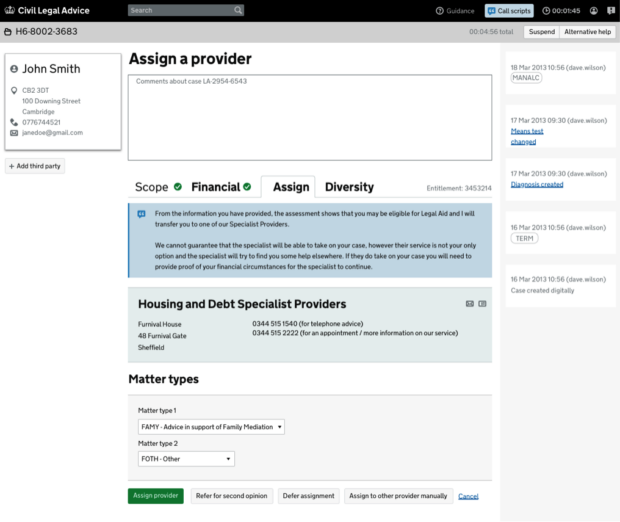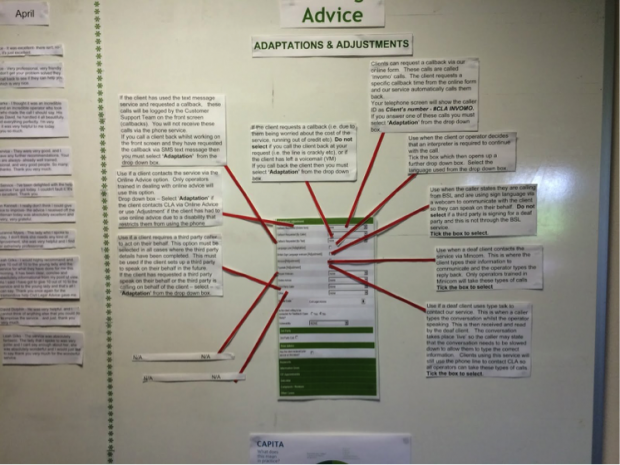How we worked closely with call centre staff to build a digital service for people looking for legal help in difficult circumstances.
The starting point: a complex service
The remit of the existing Civil Legal Advice call centre is large and diverse. People phone in with a wide range of problems, and staff have to quickly and accurately decide if they can get legal aid, and the best organisations to help if not.
We worked with a team from the Legal Aid Agency and redesigned the service from the ground up. We built modular software to support operators’ tasks with diagnosis tools, a knowledge base and help sections, session tracking and more.
This has meant that, since launching just over a year ago, CLA has provided help to over 150,000 people, and nearly 30,000 cases have been transferred to legal specialists.

Watching, listening and learning
We've trebled the number of people starting their query online, with a web tool to help the public check if they can get legal aid.
While focusing on members of the public, we made sure we didn’t neglect the needs of call centre staff. We spent many sessions watching staff take calls and observed:
- how much mental effort they spent trying to shape a conversation (often with a stressed caller) based around the software
- how many workarounds were needed to ensure they didn’t lose their work
- how much time was spent capturing data for users who should quickly be diverted to an alternative source of help
Acting on feedback
Right from the outset we worked with the LAA to collect and prioritise feedback straight from the call centre – during testing, training, the pilot and when the service went live.
We used analytics or system metrics to amplify or discard insights and held weekly calls with the LAA to prioritise the next phase of work.
Between August and December 2014 we delivered over 150 improvements based on emerging user needs which had never been considered in any up-front specification, such as:
- letting operators capture personal information at relevant times during the call
- requiring only the minimum information and input to give the right answer
- saving work every few seconds
- offering contextual help for operators to customise each call based on their own level of skill
Henry Hadlow in the Government Digital Service design team highlighted just how good our support for staff is. But we take greatest pride in feedback from users who’ve told us “we wish all staff had this” and “it’s really Apple-like”.

Innovation challenge and going live
The project has been chosen as one of the 5 finalists in the civil service innovation challenge.
The judges were impressed that the project had been designed around the needs of users, with agile methods, cloud technologies and open source code.
We have now also joined the 2 products – operator and public – together to make one end-to-end service with a shared backlog. We took it to GDS to assess it against government service standards and it's now fully live.
Working together
We could only have done this with 2 sets of experts working together. The LAA joined every planning session and came with us to every GDS assessment. Their input is reflected in the quality of the overall service for operators and members of the public.
We’ve shown that the LAA can work together with MOJ Digital – in an agile way – to make services that are built around the needs of our users.

Open resources for technical teams
If you’re working in government and looking at similar services, we can give your technical teams an open-source call centre package.
Check out the packages below:
- Front end for public to diagnose/submit cases
- Operator interface
- Python application for database/business logic
- Design assets in Sketch format, with some sample journeys and animations
Let us know what you think
Are you interested in learning more about how we built the system? Or have you worked with users on software for similar call centres?
Please get in touch – we'd love to know what you think.
Like this blog? Keep posted: sign up for email alerts.

2 comments
Comment by Karen Pitts posted on
I'm interested in the Knowledge Base mentioned in this blog, how do I find out more??
Comment by Graham Lee posted on
Hi Karen,
Thanks for getting in touch – I'll send you an email to pass on details of someone who can help.
Best wishes,
Graham